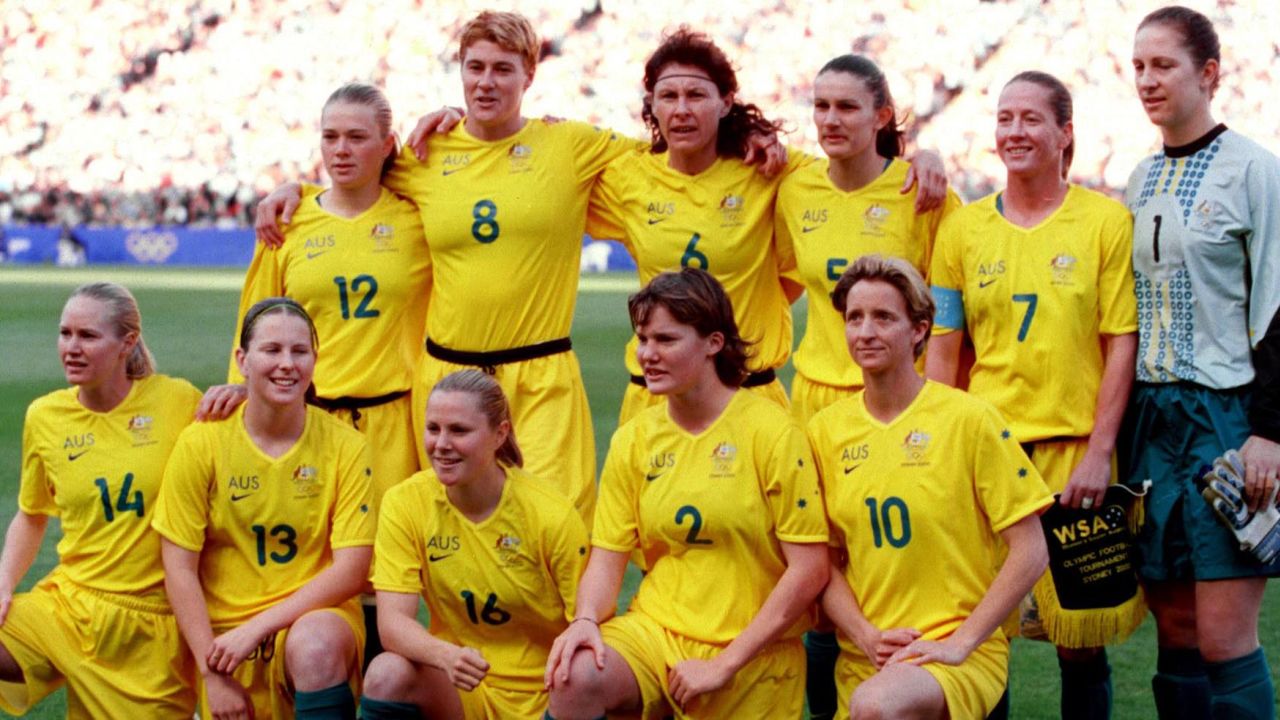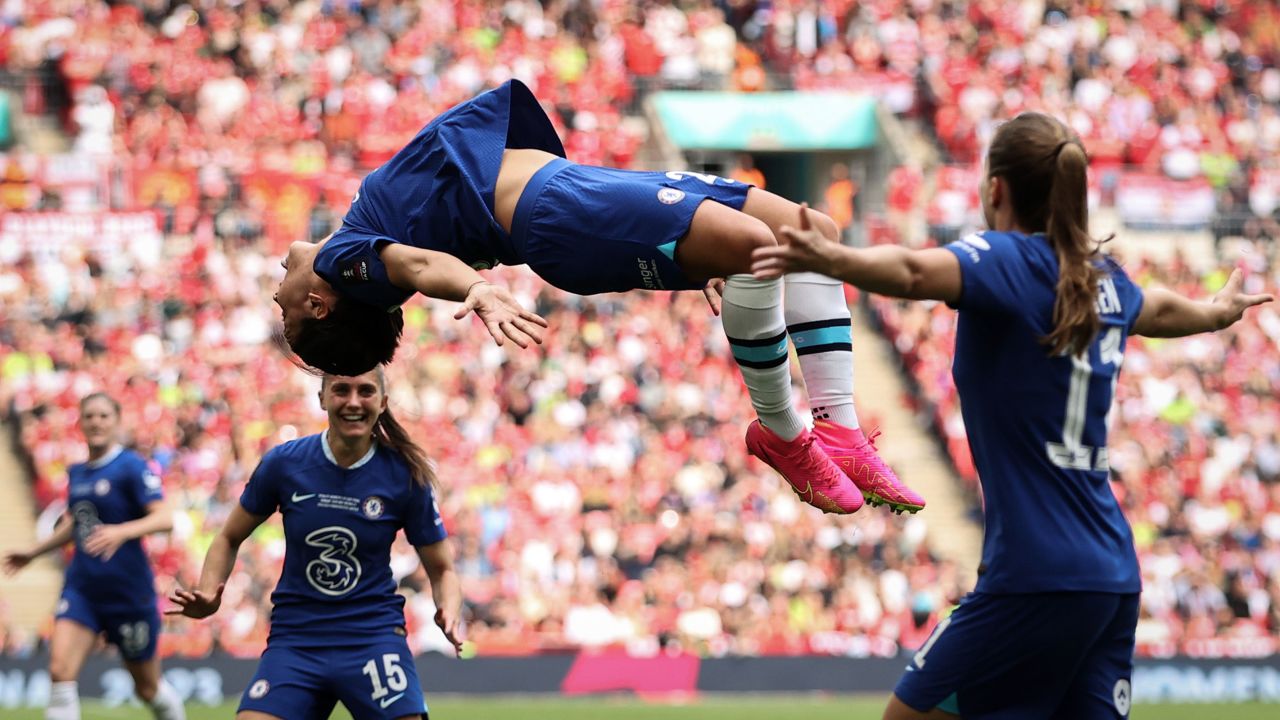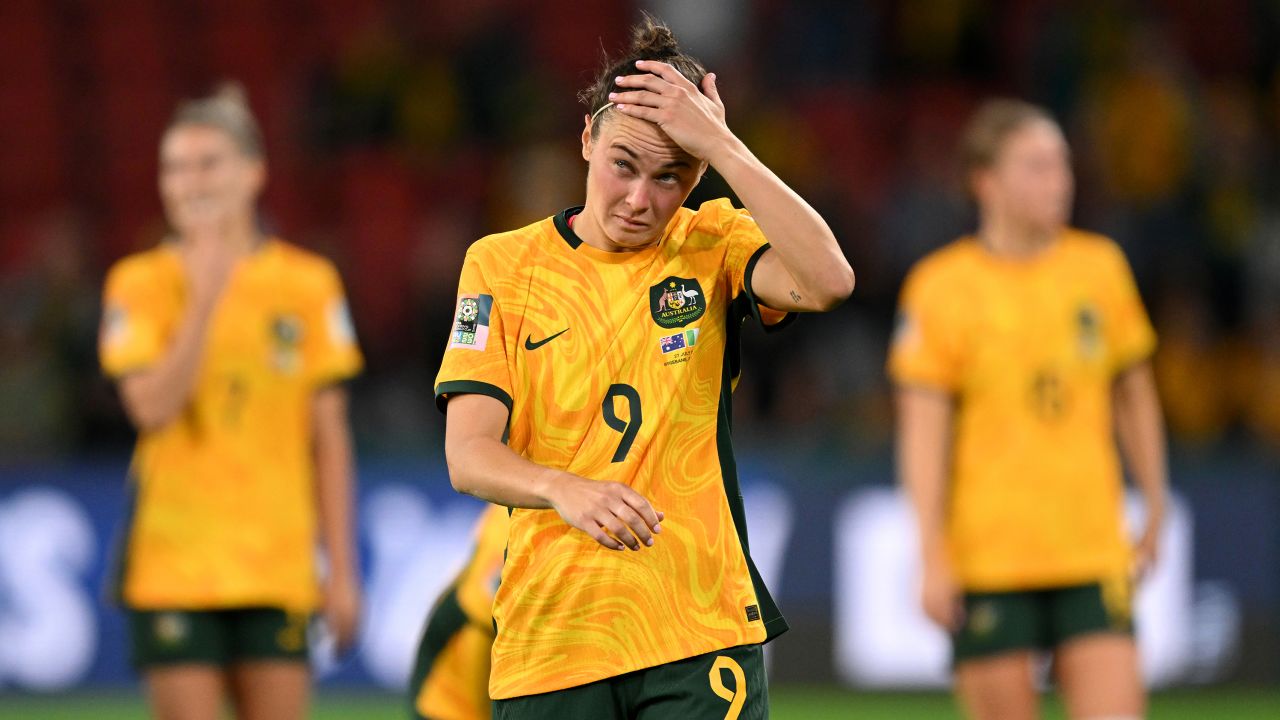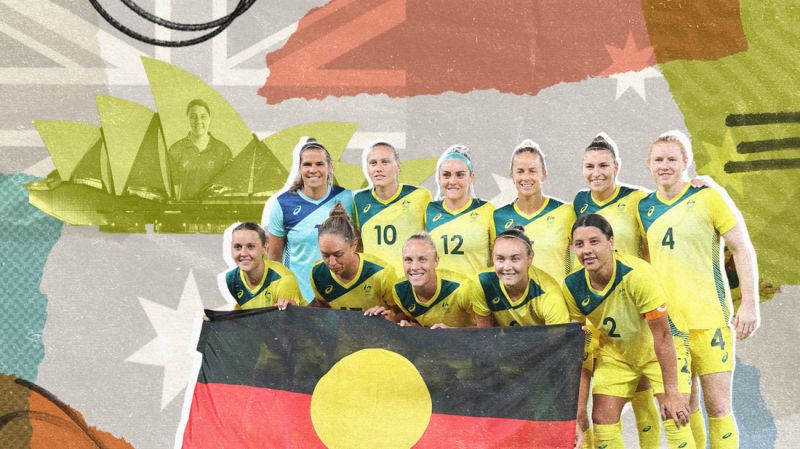The world turns upside down during Sam Kerr’s trademark goalscoring celebration. She wheels away from the goal, cartwheels across the pitch and completes it with a backflip, soaking in the rapturous applause of the crowd.
And when a photo of a backflipping Kerr was projected onto the famous sails of the Sydney Opera House to mark successful Australia’s bid for this year’s Women’s World Cup, it confirmed that women’s soccer Down Under has been turned upside down too.
Twenty years previously, the Matildas were so underfunded that they posed for and sold a nude calendar to raise money to help the team prepare for a home Olympics in Sydney.
It was a Disney documentary that detailed their build-up up to this year’s tournament, offering glimpses into the players’ lives outside football: Ellie Carpenter’s rehabilitation after she suffered an ACL injury, the sacrifices Kerr makes being in a long-distance relationship with her partner, as well as Katrina Gorry’s return to the field while juggling motherhood.
“I think the fundamental difference between then and now is the visibility of the game. You can see it to the point where you can touch it,” Heather Reid, former director of Women’s Soccer Australia, tells CNN Sport.
As one of the co-hosts, this year’s Women’s World Cup was supposed to be the culmination of all this change; a celebration of Australia’s most beloved team. But it hasn’t quite worked out like that.
Captain, talisman and star striker Kerr suffered a calf injury before the team’s first game, ruling her out for the first two group matches. A shaky 1-0 win against Ireland kicked off the Matildas’ tournament before disaster struck once more and they succumbed to a shock 3-2 defeat against Nigeria.
Now the Matildas teeter on the edge of a premature group stage exit at their own World Cup, requiring a win against Canada on Monday – on paper their toughest opponent in the group – to progress to the knockout stages.
“If it’s not a win, then it’s a disaster really for a host nation that’s had so much put into it and with so much expectation,” Reid says.
‘A love of the game’
The Matildas were not always so well-known in Australia and played without the pressure that now circles around the upcoming game against Canada.
“They existed in spite of the lack of resources for women’s football and it was really thanks to some women who had a love of the game, saw the potential of it, created their own teams and tournaments and just persevered,” Fiona Crawford, author of “The Matilda Effect,” tells CNN Sport.
Sonia Gegenhuber, who won 75 caps for the Matildas from 1989-99, remembers working various casual jobs to financially support her playing career.
“It was challenging back then for me to keep a job as it was hard to have time off when the team went away,” she tells CNN Sport.
Since then, the Matildas’ profile has grown exponentially in Australia, partly because of a move to the more difficult Asian Federation, the 2000 Sydney Olympics – which led to more funding – and the rise of social media, allowing the team to “engage directly with fans and build that audience themselves,” Crawford says.

The infamous nude calendar was instrumental in the Matildas’ rise too. “Everybody wanted to get a copy of the calendar,” Reid says. “The Matildas brand, which was one of the purposes of doing the calendar, was out there.”
Most importantly, the Matildas are now relatively well-funded after going on strike over equal pay following the 2015 Women’s World Cup, in which they became the first Australian team to win a World Cup knockout match when they defeated Brazil 1-0 in the last 16, and agreeing a historic pay deal in 2019 which sees them take an equal share of all commercial revenues.
That 2015 run marked the Matildas’ best World Cup performance to date, after appearing in every edition since 1995.
But it has been a rocky few years for the Matildas.
After losing in the round of 16 at the 2019 World Cup, Tony Gustavsson – who won two World Cups with the US Women’s National Team (USWNT) as its primary assistant coach – was appointed in January 2021 to make the necessary changes and harness the talent of Australia’s “Golden Generation,” as this team is often dubbed.

Gustavsson’s self-proclaimed strategy of exposing the Matildas to the world’s best teams on a regular basis had seen them slip down the world rankings, from seventh in December 2020 to their most recent low of 13th in October 2022.
Flashes of the team’s unpredictable brilliance have appeared, disappeared and reappeared; its spirit embodied by its motto “Never Say Die.” A series of disappointing defeats in 2021 was followed by a fourth place at the Tokyo Olympics, after a thrilling bronze medal match in which the Matildas almost toppled reigning world champion the USWNT.
A shock defeat to South Korea in the quarterfinals of the Women’s Asian Cup – a tournament the Matildas were widely expected to win – followed before an understrength squad suffered a 7-0 defeat against Spain – the team’s heaviest loss in 25 years.
Recently, however, the Matildas have offered glimpses of their status as an emerging force on the world stage. Even with a squad decimated by injury, they defeated England 2-0 on home soil in April, ending the Lionesses’ 30-match unbeaten run and capping a year in which they have also defeated Sweden and Spain, two teams ranked above them.
Such heights seemed an age away following the potentially catastrophic loss to Nigeria as the players wandered around the pitch afterwards, shaking their opponents hands as if in a bad dream, their eyes blank and stunned.
“I think there’s an expectation, even if it’s a subconscious one, that as the host nation you’re going to have a fairytale finish,” Crawford said. “So it’s been a bit tricky to first have the talismanic Sam Kerr injured and to struggle to make it out of the group. This is not how we pictured our tournament at all.”

Almost as soon as the match had finished, attention turned to how the Matildas could turn their fortunes around before facing Canada.
“I think that might be one of the most important questions for me as a leader right now,” Gustavsson told reporters after the match.
“Physical recovery is one thing, but the mental recovery as well to bounce back [is important]. But the one thing we know with this team, and we saw it the last 10 to 12 minutes of this game, is that never say die attitude when we’re up against the wall.”
Kerr will “be available” for the decisive match against Canada in a boost for the Matildas, though she told reporters on Saturday that “how we decide to use that is not to be given to the opposition.”
‘An amazing atmosphere’
Australia is not traditionally a soccer-loving country. Rugby league, Aussie Rules and cricket hold sway Down Under. But sport, any kind of sport, is deeply ingrained into Australian culture, woven into its very soul like a crest on a jersey, and the public has embraced the rise of the Matildas, voting them the country’s most beloved national team in 2019.
“I think people are starting to wake up to (soccer) now,” Majella Card, a member of the fan group MatildasActive, told CNN Sport before the tournament began. “But I think a lot of the mainstream sports fans maybe don’t realize how big the World Cup is going to be.”

FIFA moved the Matildas’ opening game against Ireland to Stadium Australia in Sydney, with its capacity of 83,000, such has been the demand for tickets. The assembled 75,784 fans represented a record crowd for a women’s soccer match in the country and the highest attendance at a Women’s World Cup for 24 years, according to FIFA.
More than 1.5million tickets have been sold so far for the 64 matches, FIFA said last week.
Card says it fell to fan groups to “make do and actually do a lot of the work” at previous tournaments to conjure up the party spirit that defines World Cups.
But for the first time, there will be official fan zones in all the host cities this year, which Card hopes will emulate the atmosphere that gripped Australia last year when its men’s team reached the last 16 of Qatar 2022.
Even the Sydney Harbour Bridge played host to festivities earlier this month.
“They’ve chosen really good locations,” Simon Reus, another member of MatildasActive, added. “The majority of the fan fests are right in the heart of the city so it’s going to create an even more amazing atmosphere because travelling fans from our experience tend to stay in the center of cities.”
Even games without Australia on the field have drawn huge crowds – almost 50,000 fans watched France stun Brazil 2-1 with a late winner on Saturday.
Sports stores in Australia are “packed with (Matildas) merchandise,” Crawford said, “and things like the Haiti scarves were selling out at the game.
“It’s definitely transcended the traditional women’s community and so that’s really exciting.”
Australia has played its part in making this the biggest Women’s World Cup in history. It remains to be seen whether the rest of the tournament will carry on without the host nation’s beloved team.


